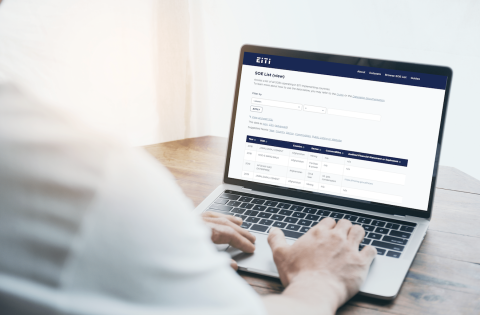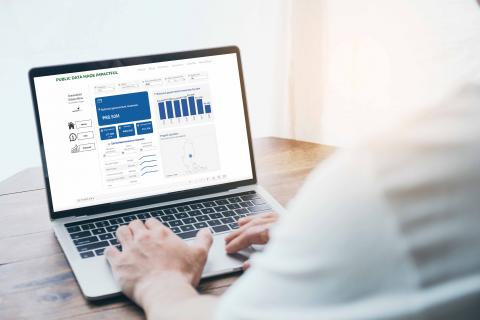
Section 7 of Part 1 of the 2023 EITI Standard
This section sets out recommendations on publishing open data for EITI implementing countries.
Preamble
1. This policy contains recommendations on open data in implementation of the EITI within the agreed scope of EITI implementation at the national level. It complements the requirements regarding open data as per Requirement 7. It builds on lessons emerging from national level implementation and emerging international best practiceHideIncluding the Open Government Partnership, the G8 Open Data Charter and Technical Annex, the Open Data Charter, the Open Definition and the World Wide Web Consortium (W3C) for developing data standards. and encourages systematic disclosure.
2. The EITI Principles declare that “a public understanding of government revenues and expenditure over time [can] help public debate and inform choice of appropriate and realistic options for sustainable development” (EITI Principle 4). The EITI Standard therefore requires EITI disclosures to be “comprehensible, actively promoted, publicly accessible, and contribute to public debate” (Requirement 7.1). Improving the accessibility, reliability, relevance, timeliness and comparability of EITI data is essential to realise these objectives.
3. To help realise the EITI Principles, the EITI Board has agreed that systematic disclosure of EITI data through government and company systems is now the default expectation. The EITI encourages routine disclosure from the reporting entities in open formats at the national level within the agreed scope of EITI implementation.
4. The EITI acknowledges that the circumstances differ in each implementing country, that not all countries will be able to transition to open data at the same speed, and that the financial implications need to be considered, both in the near and long term. The demand from the public and the use of the data to address public policy issues should be consideredHideThe key is to “publish with purpose”, meaning that data publication should be embedded to solving specific policy problems.. Access challenges and information needs of different genders and subgroups of citizens should also be taken into account.
Open data objectives
5. Open data from EITI implementation can improve transparency of government and business activities and increase awareness about how countries’ natural resources are governed. It can shed light on who owns extractive companies; who holds licenses and permits; what the relevant fiscal terms are; and what extractives revenues are levied and spent. Such disclosures provide strong incentives for revenues to be used most effectively.
6. Open data is effective and useful when it is timely, of good quality, and addresses stakeholder needs and expectations. EITI implementation should promote accountability and good governance; enhance public debate and citizen engagement; help combat corruption through enhanced government accountability; and improve the delivery of government services. Providing access to comprehensive data can empower individuals, the media, civil society and business to make better informed choices about the services they receive and the standards they should expect. Open data can also be a valuable tool for government in improving policymaking and sector management.
7. Free access to and subsequent use of open data are of significant value to society and the economy. It can be a valuable source of information to multi-stakeholder groups in EITI implementing countries.
8. Emerging data standards can contribute to making data interoperable. Adopting data standardsHideSee for example Open Ownership (no date), “Beneficial Ownership Data Standard” and Open Contracting (no date), “Open Contracting Data Standard” also contributes to the sustainability of data publishing; supports the capacity of governments, industry and civil society to prepare and publish data through accessing existing tools and resources; and can support data use and analysis where standards are thoughtfully designed, and communities of users form around them.
Open data in EITI Implementation
9. EITI Implementing countries are encouraged to:
- a) Systematically publish open data by embedding open data policies and strategies in reporting entities involved in EITI reporting, to ensure disclosure of data that is timely, high quality, accessible and cost effective.
- b) Work with usersHideUsers can refer to citizens, the media, academia and other government agencies who use data from other agencies for their own service delivery. to identify priority data sets and the form that the data delivery should take.
- c) Consider different user needs and access challenges based on gender, ethnic and geographic representation.
- d) Ensure that data is provided in granular, machine-readable formats and fully described, so that users have sufficient information to understand their strengths, weaknesses, analytical limitations and security requirements, as well as how to process the data.
- e) Release data as early as possible, allow users to provide feedback, and then continue to make revisions to ensure the highest standards of open data quality.
- f) Release data under an open license, preferably Creative Commons Attribution 4.0, that allows users to freely obtain and easily re-use it.
- g) Share technical expertise and experience with other countries to maximise the potential of open data in a socially inclusive manner.
- h) Work to increase open data literacy and encourage people, such as developers of applications and civil society organisations that work in the field of open data promotion, to unlock the value of open data.
- i) Ensure that data is interoperable with national and international standards, including adopting data standards approved by the EITI Board and additional guidance provided by the EITI International Secretariat.
- j) Where possible support the cross-referencing of data with other datasets by using unique, persistent and public identifiers for commercial and government entities.
- k) Consider the technical infrastructureHideTechnical infrastructure relates to the information technology and skills needed to enable data to be collected, cleaned, connected to other datasets and published. Mapping data ecosystems can be a way to chart out the technical infrastructure and actors related to the collection, curation and publication of data. to deliver and use the open data.
- l) Consider the governance and sustainability of open data policies as to ensure that reporting entities have a data steward, data is retained, and security standards are in place.
Engagement with the open data community
10. To learn from and shape best practices of government open data, EITI implementing countries are encouraged to endorse the Open Data Charter and other relevant initiatives.
11. To transfer lessons learned from EITI countries and draw from international experience, the EITI International Secretariat should engage in working groups focusing on open data, where considered complementary.




